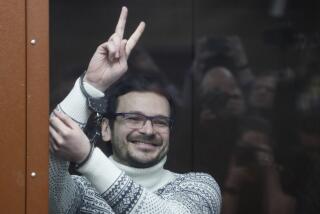Only 10 Political Prisoners, Moscow Says; Number Is Disputed
MOSCOW — The Soviet Union said Monday that it is holding only 10 political prisoners, raising questions about West German Chancellor Helmut Kohl’s statement last week that the Kremlin was ready to free all those considered by the West to be imprisoned for their political or religious beliefs.
Boris V. Kravtsov, the Soviet justice minister, said that a canvass of prison records found only 10 people in prison or internal exile following their conviction on charges of “anti-Soviet agitation,” defaming the state or religious dissent.
In addition, about 25 people are currently held in psychiatric institutions following their commitment by Soviet courts after they were charged with anti-government political activities, according to Alexei Glukhov, a senior Foreign Ministry official.
New Policies
Each case is being reexamined, Glukhov told an international conference of journalists, in the light of new policies that no one should be prosecuted for political dissent but only for actual calls or attempts to overthrow the government.
But the Soviet figures left in doubt who would be released under the commitment that Kohl said he received during his talks here last week with President Mikhail S. Gorbachev and other Soviet leaders.
Kohl declared firmly that he had been promised that all those “regarded by the West” as political prisoners would be freed by the end of the year.
“The chancellor was quite precise in his formulation for, as everyone understands, the number of people regarded by the West as political prisoners is different from those regarded here that way,” a West German diplomat said of Kohl’s statement. “The chancellor stressed not only in his news conference but in his conversations with Mr. Gorbachev the need to release those ‘regarded by the West’ as political prisoners, and that is the context in which he spoke.”
Amnesty International, which documents the individual cases of “prisoners of conscience,” says there are 150 political prisoners in the Soviet Union at present, including political dissidents, religious dissenters, conscientious objectors refusing to do military service and nationalists from the Baltic republics, the Ukraine and other parts of the country.
Other human rights groups, which use broader criteria, estimate that there are between 250 and 300 political prisoners in the Soviet Union at present, despite the release of more than 300 in the past 18 months.
The discrepancy opens the way for a bitter dispute in January over whether all political prisoners have been released. With Gorbachev due in West Germany for a return visit early next year, the question could become a major issue.
In September, Soviet Foreign Minister Eduard A. Shevardnadze gave Secretary of State George P. Shultz a list of about 40 people who were to be freed, according to the State Department. Last week, Soviet Foreign Ministry spokesman Gennady I. Gerasimov estimated that perhaps two dozen people were being held on political charges.
Of the 10 listed by Kravtsov on Monday as still imprisoned or in internal exile, seven were convicted on charges of “anti-Soviet agitation,” one on a charge of defaming the Soviet state and social system and two on charges of violating laws regulating religious practices. Two others were released late last week, he noted.
An American medical delegation is due here this month, Glukhov added, and psychiatrists in the group will be able to examine those regarded as political prisoners who are still held.
Kravtsov noted that the new penal code, now being drafted, will drop the article providing for punishment of those who defame the Soviet system and will limit the definition of anti-Soviet agitation to “concrete actions that would be manifested in, say, calls for the overthrow of the government.”
He also said that in the past nine months, 65,765 people have been allowed to emigrate, several times the total for last year, and of that number, 11,532 were granted exit visas for Israel, a 13-fold increase. Only 1.5% of the applications for emigration were rejected on security grounds, he said.
More to Read
Sign up for Essential California
The most important California stories and recommendations in your inbox every morning.
You may occasionally receive promotional content from the Los Angeles Times.










